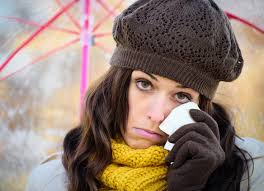Winter can be a tough season for our eyes, with the season’s cold, dry temperatures, heavy winds, and harmful UV rays reflecting off snow and ice. Eyes require moisture, but during wintertime, there’s little to be found. Outdoors, there’s less humidity, and indoors, we dry up our homes blasting the heater. We don’t hate winter, but that doesn’t stop us from all-out crying after two minutes in the cold. Is it Abnormal? Nope—it’s our eyes’ normal biological response.
Your eyes need to stay lubricated to see, which doesn’t go well with cold, dry winter air. The wind and lack of moisture leads your eyes to tear up, trying to keep themselves at max visibility and minimum discomfort. It’s basically a reflex response—and when the tears overwhelm your tear ducts, they make a dramatic exit down your cheeks (and nose, so no worries about wiping it on a sleeve).
The lack of humidity makes your eyes tear more, as does brightness: All that light reflecting off snow makes your eyes more sensitive.
Glasses are your best defence against weeping on the way to work, because the glass creates a tiny greenhouse effect and keeps the air in front of your eyes more humid. Any glasses will work, but sunglasses pull double-duty against brightness.
If your eyes are still watering, try putting in a few wetting eyedrops before going outside. It may seem counterintuitive—add moisture to stop moisture—but the drops will keep your eyes from going into overdrive. Everyone’s eye sensitivity is genetically different, but if you’re facing excessive wetness and tearing up indoors, check with your doctor to make sure nothing else is up (could be a blocked duct, could be an abnormally small drainage system, or could be nothing).
Tearing is just your eyes’ response to dry winter air, and while it might be annoying to constantly explain that no, you’re not crying, it’s better than living with blurred vision or irritated peepers. Like most things, it comes down to genetics—and also like most things, sunglasses (and eyedrops) will help keep you cool.

